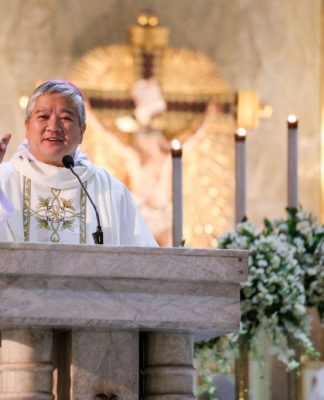GOD’S mercy to humanity is limitless, even to non-believers.
In an attempt to reach out to atheists, Pope Francis wrote an open letter to Italian daily La Repubblica, addressed to its editor and to non-Christian readers.
Responding to the questions of its editor, the atheist Dr. Eugenio Scalfari, Pope Francis cited Catholic teachings to urge atheists and non-believers to pursue their beliefs based on their conscience and will.
The God of the Christians does not condemn those who do not believe and do not seek faith, but is inviting them to ask for forgiveness, he said.
"God’s mercy has no limits if he who asks for mercy does so in contrition and with a sincere heart," the Pope wrote.
Meanwhile, Thomas Rosica, a Vatican spokesperson, reminded people of Church teaching that atheists won’t be saved and Pope Francis’ statement only implied that non-believers could still be saved through their acceptance of God’s mercy.
He referred to the Catechism of the Catholic Church (CCC), which states that those who do not believe the teachings of Christ cannot attain salvation.
"All salvation comes from Christ, the Head, through the Church which is his body," Rosica wrote.
No. 605 of the CCC states that “the Church teaches that Christ died for all men without exception. There is not, never has been, and never will be a single human being for whom Christ did not suffer.”
Misinterpretation
After La Repubblica published the letter, headlines like “Pope Francis says atheists who do good are redeemed, not just Catholics,” “Pope Francis assures atheists: You don’t have to believe in God to go to heaven,” and “Pope lets atheists off the hook,” appeared in various online publications, giving the impression the Pope’s statement on redemption changed Catholic teaching.
The media reinterpreted the Pope’s words with the spin that he was “liberalizing” the Church, said Tim Bradley, a historian, in The Telegraph.
“The mainstream media is going wild about a letter that Francis has written about atheists and agnostics, in which he appears to say that belief in God is not a requirement to get into Heaven,” Bradley wrote.
Bradley expounded on the pope’s statement that “God’s mercy has no limits.”
“As for Catholics, the Almighty will forgive them of their sins, so we have faith that he will do the same for others.”
Believing that the Church offers the keys to the kingdom of Heaven, Catholics do their best to be good disciples, Bradley said.
Meanwhile, Fr. Conegondo Garganta, executive secretary of the Catholic Bishops’ Conference of the Philippines— Episcopal Commission on Youth (CBCP-ECY) said the pontiff’s remarks should not be misinterpreted as they were based on his understanding of Catholic Catechism.
“When Pope Francis gave that statement, I can affirm that he is coming from a wealthy pastoral experience that is basically supported by his knowledge of the Word of God,” Garganta said in an interview with the Varsitarian.
Pope Francis’ call for atheists to do good should not be interpreted as a way of being saved for it is only when one has accepted God as Savior that a person can be saved, he said.
“Those are selective interpretations. One can perceive that doing one good action is enough, but it’s not. This salvation is based on a relationship of knowing God,” he said.
Challenge
Garganta reminded the faithful of the importance of knowing faith to avoid generalizations of the teachings of the Church.
“The challenge for all of us is that when someone comes to us, there is an expectation that we will be able to give an answer to questions about faith,” Garganta said. “There really is a challenge for a Catholic to know his faith, so we need to learn them. We should not always depend on what the bishop or the Pope says.”
The CCC views that atheism as a “serious problem.”
“Since it rejects or denies the existence of God, atheism is a sin against the virtue of religion. The imputability of this offense can be significantly diminished in virtue of the intentions and the circumstances,” No. 2125 of the Catechism states.
“Atheism is often based on a false conception of human autonomy, exaggerated to the point of refusing any dependence on God. Yet, to acknowledge God is in no way to oppose the dignity of man, since such dignity is grounded and brought to perfection in God for the Church knows full well that her message is in harmony with the most secret desires of the human heart.”
Garganta recalled Pope Francis’ story on the disciples and Jesus in the Gospel of Mark, as a representation of God’s mercy.
“It us up to us how we will manifest our acceptance of that welcoming gesture of God through Jesus. God is ready to welcome us,” he said.
“We were all saved but each one of us needs to make a response. It could be perceived that you were redeemed, but you are not yet saved because you remain to be tied with sins, you continue living through wrong beliefs, you continue to reject the offer of God’s forgiveness. You continue to reject salvation.”
“Atheists might also enter the gate of heaven. But even us, believers, should be aware of this and understand what qualifies our condition and manifestation of our belief in Jesus,” Garganta said. “The Pope said you cannot judge any person. You do not know what is inside an individual person.” Angeli Mae S. Cantillana and April Joy E. Dy














